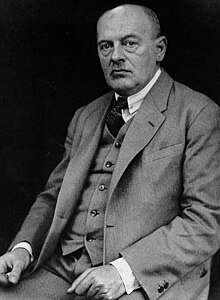Max Scheler | |
|---|---|
 | |
| Born | Max Ferdinand Scheler 22 August 1874 |
| Died | 19 May 1928 (aged 53) |
| Era | 20th-century philosophy |
| Region | Western philosophy |
| School | Phenomenology Munich phenomenology Ethical personalism |
| Doctoral students | Hendrik G. Stoker |
Main interests | History of ideas, value theory, ethics, philosophical anthropology, consciousness studies, sociology of knowledge, philosophy of religion |
Notable ideas | Value-ethics, stratification of emotional life, ressentiment, ethical personalism |
Preview warning: Page using Template:Infobox philosopher with unknown parameter "influences"
Preview warning: Page using Template:Infobox philosopher with unknown parameter "influenced"
Max Ferdinand Scheler (German: [ˈʃeːlɐ]; 22 August 1874 – 19 May 1928) was a German philosopher known for his work in phenomenology, ethics, and philosophical anthropology. Considered in his lifetime one of the most prominent German philosophers,[1] Scheler developed the philosophical method of Edmund Husserl, the founder of phenomenology.
After Scheler's death in 1928, Martin Heidegger affirmed, with Ortega y Gasset, that all philosophers of the century were indebted to Scheler and praised him as "the strongest philosophical force in modern Germany, nay, in contemporary Europe and in contemporary philosophy as such."[2]
- ^ Davis, Zachary and Anthony Steinbock, "Max Scheler", The Stanford Encyclopedia of Philosophy (Spring 2019 Edition), Edward N. Zalta (ed.), URL = <https://plato.stanford.edu/archives/spr2019/entries/scheler/>.
- ^ Heidegger, The Metaphysical Foundations of Logic, “In memoriam Max Scheler,” trans. Michael Heim (Indiana University Press, 1984), pp. 50-52.